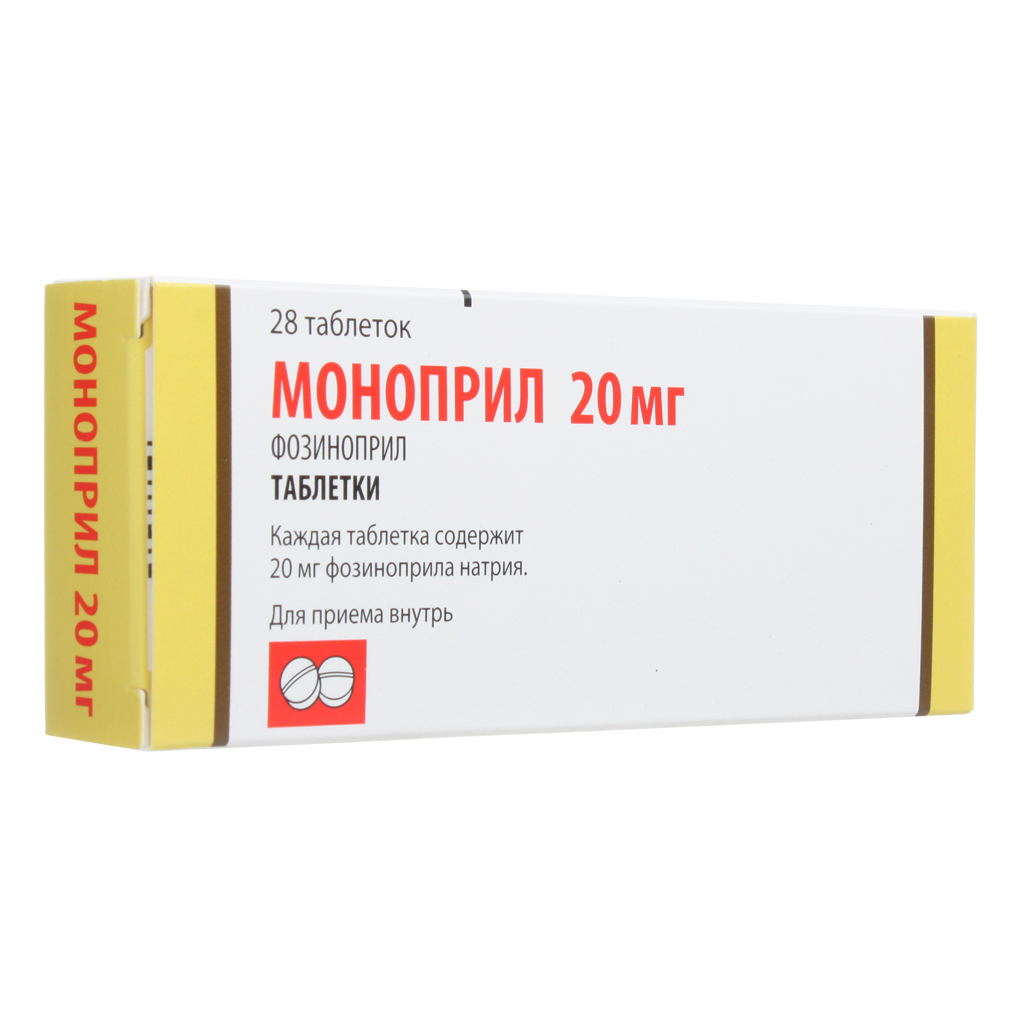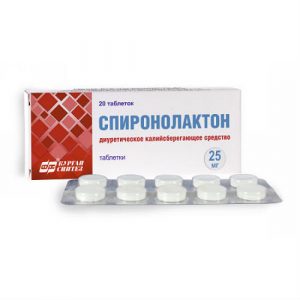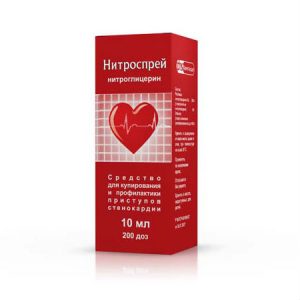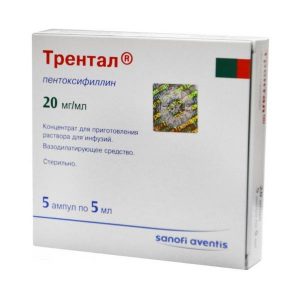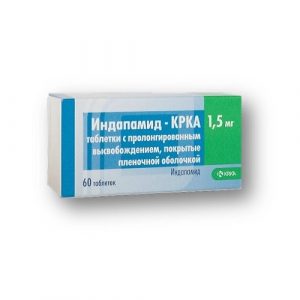Description
Release form
Tablets.
Packing
28 pcs.
Pharmacological action of
Monopril is an ACE inhibitor. Fosinopril is an ester from which the active compound fosinoprilat is formed in the body as a result of hydrolysis under the influence of esterases.
Fosinopril, due to the specific connection of the phosphate group with ACE, prevents the conversion of angiotensin I into a vasoconstrictor substance angiotensin II, as a result of which vasopressor activity and aldosterone secretion are reduced. The latter effect can lead to a slight increase in the content of potassium ions in serum (on average 0.1 meq / l) with a simultaneous loss of sodium and liquid ions from the body.
Fosinopril inhibits the metabolic degradation of bradykinin, which has a powerful vasopressor effect, due to which the antihypertensive effect of the drug can be enhanced.
In heart failure, the beneficial effects of Monopril are achieved mainly by suppressing the renin-aldosterone system. Suppression of ACE leads to a decrease in both preload and afterload on the myocardium.
In patients with heart failure, the drug improves symptoms and increases exercise tolerance, reduces the severity of heart failure, and reduces the frequency of hospitalizations for heart failure. The drug is effective without the simultaneous use of digoxin.
Indications
– arterial hypertension (for monotherapy or as part of combination therapy)
– heart failure (in combination with diuretics).
Contraindications
– angioedema for the use of ACE inhibitors in the anamnesis
– pregnancy
– lactation (breastfeeding)
– hypersensitivity to fosinopril and other components of the drug.
Pregnancy and lactation
Monopril is contraindicated in pregnancy. The use of the drug in the II and III trimesters of pregnancy causes damage or death to the developing fetus.
Since fosinoprilat is excreted in breast milk, if it is necessary to use Monopril during lactation, breastfeeding should be discontinued.
Special instructions
If angioedema develops while taking Monopril, the drug should be stopped immediately. Patients should be warned that if swelling occurs on the face, eyes, lips and tongue, spasm of the muscles of the larynx or shortness of breath, you should immediately stop taking the drug and consult a doctor. In such cases, a quick subcutaneous administration of an adrenaline solution (1: 1000) and the adoption of other emergency measures are necessary.
Caution must be exercised when prescribing the drug to patients receiving desensitizing therapy, as there is a risk of anaphylactoid reactions.
Anaphylactoid reactions have also been reported with Monopril during hemodialysis through highly permeable membranes, as well as during LDL apheresis with adsorption on dextran sulfate. In such cases, the use of a different type of dialysis membrane or other drug treatment should be considered.
In rare cases, patients with uncomplicated arterial hypertension developed monopril and developed hypotension. Symptomatic hypotension with the use of ACE inhibitors is most likely in patients after intensive treatment with diuretics and / or diets with a limited salt content, as well as during renal dialysis. A temporary hypotensive reaction is not a contraindication for the use of the drug after measures to hydrate the body.
In chronic heart failure with or without concomitant renal failure, treatment with ACE inhibitors may cause an excessive antihypertensive effect, which can lead to oliguria or azotemia, and in rare cases, to acute renal failure and death. Therefore, in the treatment of chronic heart failure with Monopril, it is necessary to carefully monitor the condition of patients, especially during the first 2 weeks of treatment, as well as with any increase in the dose of fosinopril or diuretic.
Patients with normal or low blood pressure who have previously received intensive diuretic therapy and who have low blood sodium may need a lower dose of diuretic. Arterial hypotension is not a contraindication for the further use of Monopril. Some reduction in systemic blood pressure is a common and desirable effect at the beginning of the use of the drug in heart failure.
The degree of this decrease is maximum in the early stages of treatment and stabilizes within 1-2 weeks of therapy. Blood pressure usually returns to the values ​​characteristic of the period before treatment, without reducing therapeutic efficacy. If against the background of treatment with Monopril there is noticeable yellowness and a marked increase in the activity of liver enzymes, the drug should be discontinued and appropriate treatment should be prescribed.
With arterial hypertension in patients with renal artery stenosis of one or both kidneys, as well as with the simultaneous use of diuretics without signs of kidney disease during treatment with ACE inhibitors, an increase in blood urea nitrogen and serum creatinine is possible.
These effects are usually reversible and disappear after discontinuation of treatment. A dose reduction of a diuretic and / or Monopril may be required.
In patients with severe chronic heart failure whose renal function may depend on the activity of the renin-angiotensin-aldosterone system, treatment with ACE inhibitors can lead to oliguria or progressive azotemia and, in rare cases, acute renal failure and / or death.
In patients with heart failure and diabetes who are also taking potassium-sparing diuretics, potassium supplements and / or salt substitutes containing potassium salts or other drugs that increase blood potassium (for example, heparin), the use of ACE inhibitors increases the risk development of hyperkalemia.
Since fosinopril is excreted from the body in two ways, usually, a dose reduction of Monopril is not required in the treatment of hypertension and heart failure in patients with impaired renal or hepatic function.
There are no differences in the efficacy and safety of Monopril treatment in patients 65 years of age or older and young. However, in older patients, greater susceptibility to the drug cannot be ruled out.
Monitoring laboratory parameters
With Monopril, you should periodically determine the number of leukocytes in the peripheral blood, paying attention to patients with impaired renal function, especially against collagenoses (systemic lupus erythematosus or scleroderma), because it was reported that in rare cases, ACE inhibitors cause agranulocytosis and suppression of bone marrow function are more likely in this category of patients.
Pediatric use
Safety and efficacy of Monopril in children have not been established.
Composition
1 tablet contains 20 mg fosinopril sodium.
Dosage and administration of
Before starting treatment for arterial hypertension, it is necessary to analyze the previous antihypertensive drug therapy, the degree of increase in blood pressure, restrictions on the amount of edible salt and / or liquid and other clinical circumstances. If possible, antihypertensive treatment should be discontinued according to the previously used scheme a few days before the start of treatment with Monopril.
The recommended starting dose is 10 mg 1 time / day. The dose must be selected depending on the dynamics of lowering blood pressure. The average dose is 10-40 mg 1 time / day. In the absence of a sufficient hypotensive effect, an additional prescription of diuretics is possible.
If treatment with Monopril is started with diuretic therapy, then its initial dose should be no more than 10 mg with careful medical monitoring of the patient’s condition. In order to reduce the risk of developing arterial hypotension, diuretics should be canceled 2-3 days before taking Monopril.
In chronic heart failure, the recommended starting dose is 10 mg 1 time / day. Depending on the therapeutic effectiveness, the dose can be increased with a weekly interval, increasing it to a maximum of 40 mg 1 time / day. At the beginning and during treatment, careful medical supervision is required.
The development of arterial hypotension after taking the initial dose should not interfere with the careful selection of the dose of Monopril after effective relief of arterial hypotension. For heart failure, Monopril is recommended for use in combination with a diuretic.
Side effects of
From the cardiovascular system: dizziness, palpitations, chest pains.
From the respiratory system: cough.
Allergic reactions: skin rash, itching.
From the side of the central nervous system and peripheral nervous system: a feeling of fatigue, impaired sensitivity (including paresthesia).
From the musculoskeletal system: myalgia.
From the digestive system: nausea, vomiting, dyspepsia, violation of taste sensitivity.
Generally adverse reactions when taking Monopril are mild and temporary in patients of both young and older age.
Drug interactions
The simultaneous use of antacids (including aluminum hydroxide, magnesium hydroxide, simethicone) can reduce the absorption of fosinopril (Monopril and these drugs should be taken with an interval of at least 2 hours). In patients receiving Monopril simultaneously with lithium salts, an increase in the concentration of lithium in the blood plasma and the risk of lithium intoxication may occur (use with caution at the same time).
When prescribing Monopril, it should be borne in mind that indomethacin and other NSAIDs (including acetylsalicylic acid) can reduce the antihypertensive effect of ACE inhibitors, especially in patients with low-root hypertension.
When Monopril is used together with diuretics or in combination with a strict diet that limits salt intake or dialysis, severe arterial hypotension may develop, especially in the first hour after taking the initial dose of fosinopril.
With the combined use of Monopril with potassium-sparing diuretics (including spironolactone, amiloride, triamteren), with food supplements containing potassium, the risk of hyperkalemia increases (simultaneous use with caution requires frequent monitoring of potassium levels in the blood serum).
The bioavailability of Monopril does not change with the combined use of the drug with chlortalidone, nifedipine, propranolol, hydrochlorothiazide, cimetidine, metoclopramide, propantheline, digoxin, acetylsalicylic acid and warfarin.
ACE inhibitors can enhance the antihypertensive effect of drugs used for general anesthesia.
Overdose
Symptoms: severe BP, bradycardia, shock, impaired electro-electrolyte status, acute renal failure, stupor.
Treatment: The drug should be discontinued, gastric lavage, sorbents (eg, activated carbon), vasopressor agents, infusion of 0.9% sodium chloride solution followed and symptomatic and supportive treatment indicated. Hemodialysis is ineffective.
Storage Conditions
The product should be stored in a dry place at room temperature.
active substance
Fosinopril
Terms leave through pharmacies
by prescription
The dosage form of
tablet
